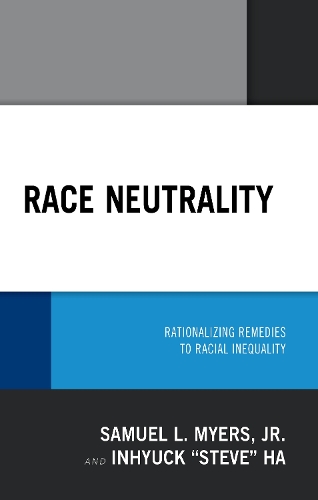
Race Neutrality: Rationalizing Remedies to Racial Inequality
(Hardback)
Available Formats
Publishing Details
Race Neutrality: Rationalizing Remedies to Racial Inequality
By (Author) Samuel L. Myers
By (author) Inhyuck Ha
Bloomsbury Publishing PLC
Lexington Books
15th October 2018
United States
Classifications
Professional and Scholarly
Non Fiction
Political economy
Public finance and taxation
305.800973
Physical Properties
Hardback
214
Width 160mm, Height 227mm, Spine 21mm
485g
Description
There are wide racial disparities in virtually every sphere of economic life. African American workers earn less than whites. They are more likely to be denied loans than whites. Minority-owned businesses are less likely to win lucrative bids on state and federal contracts than are white male owned businesses. Black children are more likely than whites to be reported to child protective services for neglect or abuse. There are even huge disparities in downing rates between blacks and whites. What to do about these disparities There is a fundamental disagreement about the appropriate remedies to these varied indicators of racial inequality. Part of the disagreement stems from differences in public perceptions about the underlying causes of the inequality. But, another form of disagreement relates to the opposition to the remedy of choice during much of the 1970s and 1980s: Affirmative Action. Race conscious remedies -- like affirmative action policies in hiring, college admissions, and business contracting -- suffer from legal and constitutional challenges, compounded by hostility from the majority of Americans. The alternative race-neutral remedies attempt to address racial disparities without directly targeting benefits exclusively to racial minority group members. In doing so, race-neutral remedies putatively help minorities without hurting majority group members. The authors of Race Neutrality: Rationalizing Remedies to Racial Inequality make the case that policy analysts should shift from a focus on whether a remedy is race-conscious or not to a focus on the underlying problem that the alternative remedies is attempting to resolve. This type of rethinking of the problem of racial inequality will reveal that sometimes race-neutral remedies hold great promise in reducing disparities. Often, however, race-neutral remedies fail to do what they are intended to do. The authors challenge the reader to think about why race-neutral remedieswhile desireable on their facemight fail to resolve protracted and persistent patterns of racial inequality in market and non-market contexts.
Reviews
This book is very timely, given the renewed debate over affirmative action and other race conscious remedies to inequality. Myers and Ha review alternative frameworks for understanding racial differences in success and provide qualitative and quantitative evidence in support the state of racial disparities and the effectiveness of race conscious and race neutral strategies to reduce those disparities. Examples from a variety of contexts enable the reader to ground the analysis in a practical way. It is a much needed contribution to ongoing discussions. -- Margaret C. Simms, Fellow at Urban Institute
Using widely varied examples of racial and ethnic economic disparities Myers and Ha, in Race Neutrality: Rationalizing Remedies to Racial Inequality provide compelling evidence to inform the reader of the complex nuances and tensions in addressing such disparities using race-conscious or race neutral mechanisms. In addition to their specific econometric methodologies, the authors masterfully present a thorough review of relevant literature and a discussion of critical points in historical context to show how ones perspective of the problem to be solved drives preferred remedies. This book is a must read for those grappling with ways to successfully address persistent racial and ethnic economic disparities in this country. -- Caroline S. Turner, Co-Author, Faculty of Color in Academe: Bittersweet Success, professor of educational leadership at California State University, Sacramento
The Myers and Ha book will challenge many policy ideas you may have on closing racial gaps in wealth, business capital and unemployment. This thoughtful book marshals data to expose fallacies in many underlying assumptions on the source of racial disparities, and makes the reader rethink policy solutions. And, in an age of growing diversity the book makes the case that the lingering effects of slavery and Jim Crow laws cannot be assumed to be corrected by efforts to simply be a more inclusive society. The reader will be more rigorous in weighing policy alternatives after reading the book. -- William E. Spriggs, Howard University
Author Bio
Inhyuck Ha is professor at Western Carolina University Samuel L. Myers Jr is professor of human relations and social justice at University of Minnesota
